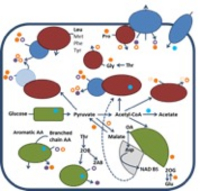Synthetic soil community

PIs: PD Dr. Meina Neumann-Schaal, Prof. Dr. Michael Pester, Dr. Katharina Fischer-Huber
Soils are essential to sustain life in terrestrial ecosystems. However, a conceptual framework that describes how the structural and functional diversity of the soil microbiome and its interaction to higher trophic levels influences energy and matter fluxes in soil is still largely missing. Together with the Department of Microorganisms, we use a synthetic soil community reflecting the major microbial taxa and microbial grazers in soil to study causal relationships between the energy and matter input to soils and the structure and function of the soil microbiome. We are specifically interested in secondary metabolite production and carbon distribution.
The project is a collaboration with the Department of Microorganisms
Clostridioides difficile – metabolism and virulence

PI: PD Dr. Meina Neumann-Schaal
Clostridioides difficile is a major nosocomial pathogen causing severe diarrhea and pseudomembranous colitis. We employ multi-omics approaches and metabolic modelling to unravel stress responses of C. difficile, central metabolic pathways and their interconnection to virulence, both in vitro and in vivo.
Current projects are in collaboration with Prof. Dr. D. Jahn, PD Dr. Rebekka Biedendieck (TU BS), Prof. Dr. Till Strowig (HZI), Dr. Susanne Sievers (University of Greifswald) and Prof. Dr. Franziska Faber (University of Würzburg). It has been funded as part of the consortium “CDInfect: Adaptation strategies of Clostridioides difficile during host infection” by the Federal State of Lower Saxony (Niedersächsisches Vorab).
Stress response and novel metabolic pathways in Sulfolobales
PI: Dr. Jacqueline Wolf, PD Dr. Meina Neumann-Schaal
The thermoacidophilic Crenarchaea Saccharolobus (formerly Sulfolobus) solfataricus and Sulfolobus acidocaldarius are model organisms for archaeal adaptation to extreme environments using broad variety of substrates. We assess both organisms with respect to novel metabolic pathways by stable isotope labelling and stress response on defined and complex substrates. We specifically focus on the fate of different sugars, specifically mannose and fructose.
This project is in collaboration with Prof. Dr. Bettina Siebers (University Duisburg/Essen) and funded by the DFG.
Adaption processes in aquatic model systems Phaeobacter inhibens and Aromatoleum aromaticum
PI: Dr. Sarah Kirstein, PD Dr. Meina Neumann-Schaal
Phaeobacter inhibens is a metabolic very versatile member of the marine Roseobacter group. We combine metabolomic and transcriptomic analyses with metabolic modelling and stable isotope labelling experiments to cover novel pathways, assign gene functions and regulation mechanisms.
Aromatoleum aromaticum has been isolated from Weser sediment and degrades a wide variety of aromatic compounds under anaerobic and aerobic conditions. We are interested in metabolic networks and the adaptation to different substrates.
These projects are in collaboration with Prof. Dr. Ralf Rabus (University of Oldenburg) and Prof. Dr. Jörn Petersen (DSMZ) (former CRC 51 “Roseobacter”).
Vesicles – implications for metabolic properties

PI: Svea Holland, PD Dr. Meina Neumann-Schaal
Vesicles are frequently observed in cultivations of gram-negative bacteria, however little is known about biogenesis and metabolic properties of these vesicles and their relation to cellular metabolism.
In joint projects with colleagues from the DSMZ, the TU BS (D. Jahn, R. Biedendieck, A. Wegner) and the HZI, we try to understand basic mechanisms, composition and metabolic implications.
Aquirufa: Biodiversity and ecology of freshwater bacteria
PI: PD Dr. Meina Neumann-Schaal
As a partner, we join the Sparkling Science project (September 2022 to August 2025) funded by the Austrian Bundesministerium Bildung, Wissenschaft und Forschung. The genus Aquirufa is the midpoint of this citizen science project. Aquirufa is a widespread group of bacteria in freshwaters and plays an important role in the functioning of these ecosystems. The project team of the Research Department for Limnology, Mondsee (University of Innsbruck), Haus der Natur, Salzburg and the DSMZ works together with various groups of citizen scientists to study the distribution, ecology, and biodiversity of Aquirufa in freshwater habitats in Salzburg and Upper Austria. During the project six school classes, as well as additional groups of citizen scientists, will take water samples and will handle them under the instructions of the project team. We will be involved in describing newly discovered Aquirufa species scientifically. The citizen scientists will be actively involved in the whole research process, from the first beginning up to publishing. Further information can be found on www.sparklingbacteria.com.
Lipid profiles of archaeal cell walls
PI: Dr. Jacqueline Wolf
Methanogenic archaea are an important part of the human gut microbiome, playing a key role in shaping the metabolic alignment of the microbiome. Together with bacteria they are also involved in the development, training and function of the host immune system. However, to date the knowledge of the immunogenic properties of methanogenic archaea is very limited. We are analyzing the cell-wall composition (lipids, sugars) of human-associated archaea (e.g. Methanobrevibacter smithii), in order to identify specific factors, which could influence phagocytosis by immune cells.
This project is in collaboration with Prof. Dr. Christine Moissl-Eichinger (Medical University of Graz).

